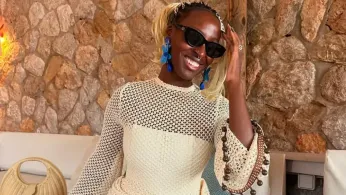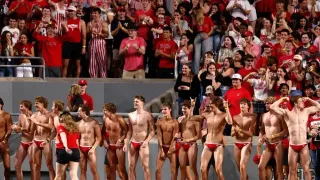
9 hours ago
DJ Bridge Centers Black Queer Roots In House Music Sets And Reclaims the Dance Floor
READ TIME: 3 MIN.
In an interview published by Out Magazine on October 8, 2025, Bridget Kyeremateng—better known as DJ Bridge—shares her journey from her multicultural upbringing to her rising influence as a DJ who unapologetically centers Black queer expression in dance music culture. Kyeremateng, born in Italy to Ghanaian American parents, has found purpose in reclaiming house music’s origins and using her platform to create spaces where marginalized identities are celebrated and uplifted .
For Kyeremateng, house music is more than a genre—it is “an ancestral calling.” She describes each set as an act of spiritual freedom, tapping into the Black queer roots of the dance floor, and ensuring that her events are “for the girls and gays only.” This phrase, echoed in her social media presence and live performances, is a pointed declaration of intent: her spaces are built to center and protect those who have historically been pushed to the margins of nightlife .
Kyeremateng’s approach to DJing is rooted in a deep understanding of history. House music, which emerged from Black and LGBTQ+ communities in Chicago during the late 20th century, has often been appropriated or stripped of its origins in mainstream spaces. By intentionally curating her sets to reflect the genre’s heritage, she is reclaiming the dance floor as a site of joy, resistance, and healing for those who need it most .
In her interview, Kyeremateng speaks about the importance of honoring those who came before her. “The dance floor isn’t just a place to move your body,” she explains, “it’s a place to connect with ancestors, with community, and with yourself.” Her music choices, performance style, and the communities she fosters are all informed by this philosophy—a testament to how nightlife, when intentionally crafted, can become a space of safety and self-affirmation for LGBTQ+ people of color .
Kyeremateng’s intersectional identity—Italian-born, Ghanaian American, queer—profoundly shapes her vision. She understands firsthand the complexities of navigating multiple cultural and social identities, and she channels this into her work. By lifting up other marginalized voices, she challenges the homogeneity often present in club culture and seeks to restore the radical potential of nightlife as a site for Black queer joy .
Her commitment is evident not only in her music but in her collaborations and the communities she builds. Whether it is through partnerships with other queer artists of color or through curating events where safety and inclusivity are paramount, Kyeremateng is helping to reshape what club culture can be. Her growing influence resonates with a generation eager to see their stories reflected in the spaces they inhabit and the music they love .
For Kyeremateng, each performance is both a tribute and a forward-looking act. By invoking house music’s roots and foregrounding the experiences of Black queer people, she is both honoring the genre’s past and actively shaping its future. Her message is clear: the dance floor is not just a site of entertainment, but a living, breathing space for collective liberation .
Kyeremateng’s impact extends beyond her immediate audience. Her insistence on centering the marginalized, her refusal to dilute the radical history of house music, and her celebration of intersectional identities all contribute to a broader cultural shift within LGBTQ+ nightlife. As Out Magazine’s feature demonstrates, her work is a vital reminder of the transformative power of music and the ongoing importance of reclaiming space for those who have always belonged .
Kyeremateng’s story is part of a larger movement to re-center LGBTQ+ and especially Black queer narratives within nightlife. As documented by Out Magazine and other leading LGBTQ+ publications, there is a growing recognition of the need to honor the roots of dance music and provide spaces that are genuinely inclusive and affirming. This movement is not just aesthetic; it is deeply political, aiming to combat the erasure of queer and Black contributions to culture and to ensure that nightlife remains a site of resistance, connection, and healing .
As Kyeremateng continues to rise, her vision offers a blueprint for others: create with intention, honor those who came before, and always make space for joy. For her and for many in the community, the dance floor is sacred—a site where music, history, and identity converge in a celebration of what it means to be truly free.






